

3/21/06
Edition
PEANUTS features hit dvd!
A BOY NAMED CHARLIE BROWN and SNOOPY
reviewed
Plus FOX MARCH WRAP and Warner Super
Heroes Soar On Disc
Charles M. Schulz’s Peanuts had exploded into the popular
consciousness by the time his beloved characters hit theaters in 1969.
A BOY NAMED
CHARLIE BROWN (***½, 86 mins., G; Paramount) marked the
debut of the Peanuts clan on the big-screen, in what would be the first
of four features starring “Good O’l” Charlie Brown,
Snoopy and friends. 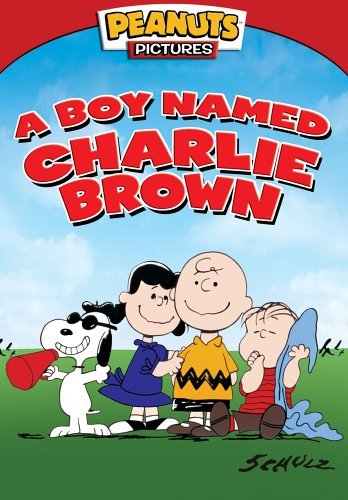
All of the principal talent behind the CBS TV specials worked on the
movie, from director Bill Melendez to producer Lee Mendelson, with
Schulz -- of course -- authoring the script, which here follows Charlie
Brown from baseball season to participating in a spelling bee with a
chance to show that he’s not just an ordinary boy with ordinary
problems (and lots of bad luck).
With the exception of occasional splashes of late ‘60s
psychedelic colors, “A Boy Named Charlie Brown” very much
feels like an extension of the Peanuts TV specials -- which is to say
it’s thoroughly charming and holds up beautifully today. Vince
Guaraldi’s trademark score was orchestrated by John Scott Trotter
(as had most of Guaraldi’s scores for the TV specials), and was
also joined in the movie by several songs from songwriter Rod McKuen.
Though some viewers -- kids in particular -- might find McKuen’s
title song to be a bit sappy, it’s a lovely, mellow tune that
poignantly opens and closes the film, underscored in the latter by
footage of the animators who worked so diligently on the production.
Next week, Paramount brings “A Boy Named Charlie Brown” to
DVD for the first time. Just as significantly, the disc also marks the
debut of its full-length, 86-minute theatrical version on video in ANY
format. Previous CBS/Fox VHS and laserdisc issues contained an
abbreviated, 79-minute cut that was apparently trimmed for television,
but Paramount finally rectifies the situation by including the original
version of the film on DVD, here presented with its seven restored
minutes intact (the “new” footage is comprised of two full
sequences and a myriad of trims to other scenes).
The print utilized here, however, is not in the greatest shape:
there’s dirt and numerous inconsistencies evident throughout,
more detectable here than in previous video releases in fact. The good
news, at least, is that the color and contrast of the print is highly
satisfying, while the remixed 5.1 Dolby Digital and 2.0 Dolby Stereo
soundtracks do full justice to Guaraldi and McKuen’s musical
offerings.
Regrettably, the 1.85 transfer (16:9 enhanced) Paramount included on
the DVD also appears to be marred by over-matting: in comparison with
earlier video and television versions, the “widescreen”
frame tends to clip the top portion of the image, robbing some of the
animation’s various background details (such as a picture hanging
on the wall in Charlie Brown’s home at the beginning of the
film). Subsequently, it seems as if “A Boy Named Charlie
Brown” was shot for a 1.66 aspect ratio, and as such should have
been more carefully transcribed to DVD; this does not appear to be a
case where “dead space” was added for full-screen formatting, but rather a
situation where the film was composed for a more TV-like aspect ratio
in the first place. That said, there’s a bit more information on
the sides of the image throughout in comparison to previous versions,
while the bottom of the frame is mostly unscathed by the matting
(adding further evidence that its intended ratio was more along the
lines of 1.66 than 1.85).
for full-screen formatting, but rather a
situation where the film was composed for a more TV-like aspect ratio
in the first place. That said, there’s a bit more information on
the sides of the image throughout in comparison to previous versions,
while the bottom of the frame is mostly unscathed by the matting
(adding further evidence that its intended ratio was more along the
lines of 1.66 than 1.85).
The success of “A Boy Named Charlie Brown” resulted in a
follow-up film, SNOOPY,
COME HOME (***, 80 mins., 1972, G; Paramount), which also marked
the introduction of Snoopy’s loveable feathered friend Woodstock
into the Peanuts canon.
The Sherman brothers also migrated from Disney to work with Schulz,
Mendelson and Melendez for this second Peanuts feature, which offers
some undeniably sad moments when Snoopy leaves Charlie Brown to return
to his former owner: a sick young girl currently in the hospital, who
writes to the dog she had to give up when her family moved away.
“Snoopy Come Home” is downright depressing in places, with
often sappy songs by the Shermans and perhaps a few too many tearful
goodbyes for its own good. The lack of Vince Guaraldi’s music, in
concert with some of the songs, may have some lamenting the absence of
Rod McKuen as well. The movie doesn’t have the light, beautifully
balanced tone of “A Boy Named Charlie Brown,” but
it’s certainly an entertaining effort with numerous highlights
for kids and Peanuts fans...it’s just not up to the level of its
predecessor.
Paramount’s DVD again feels a bit cramped in 1.85 (16:9)
widescreen, but the print utilized here is in much healthier condition,
with strong colors and an absence of dirt or other issues in the
transfer. The sound is only in standard 2.0 Dolby Surround, but it
functions just fine, making the duo a must-have -- in spite of their
somewhat questionable framing -- for Peanuts fans of all ages (who may
also note that the full “This Is America, Charlie Brown”
1988 mini-series is due out on DVD this June from the studio).
New Warner Super Heroes
With Superman returning to the screen this summer and Batman waiting in
the wings for his next adventure, Warner Home Video has been busy
releasing several DC animated series on DVD to mark the occasion.
At the top of the list is this week’s debut of BATMAN BEYOND (1999,
13 episodes, 280 mins; Warner), the thrilling continuation of
“Batman: The Animated Series” from the same producers of
that critically-acclaimed, fan-favorite show (Bruce Timm, Alan Burnett,
and Paul Dini). 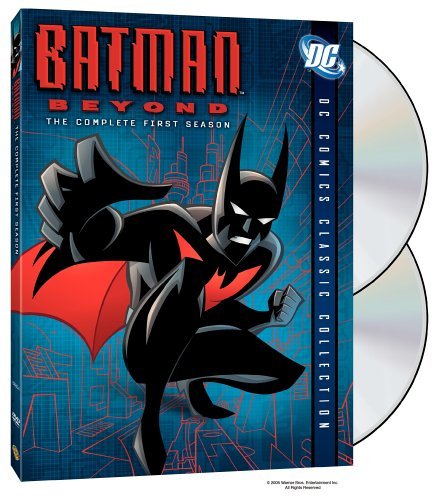
Set in a future where Bruce Wayne’s crimefighting days are long
since past and Gotham City has become a Blade Runner-esque metropolis
ridden with crime, “Batman Beyond” centers on teenage Terry
McGinnis, whose father is ruthlessly murdered by a local gang.
McGinnis’s run-in with an elderly Wayne results in the young man
donning Bruce’s futuristic costume and suiting up as the new Dark
Knight, battling the city’s new villains and being prompted by
Wayne’s advice from back at the manor all the while.
If you enjoyed B:TAS, you’re likely to love “Batman
Beyond.” Once you get past the more “modern” musical
accompaniment and new characters (which almost has more of a
“Spider-Man” kind of feel, with Terry resembling the
similarly-aged Peter Parker), the series displays the same brand of
smart writing and visual design that marked its predecessor as one of
the finest adaptations of a comic book in any visual format.
Warner’s double-disc DVD set this week compiles all 13
first-season episodes of “Batman Beyond” in satisfying
full-screen transfers with 2.0 Dolby Surround soundtracks. The studio
had previously issued individual, themed-compilations of “Batman
Beyond” on disc (most of which you can find in bargain bins these
days), so it goes without saying this comprehensive 1st Season set is
the way to go for fans.
New supplements are also on-hand as well, with commentary from Timm,
Burnett, Dini, Glen Murakami and Curt Geda on the episodes
“Rebirth: Part 1" and “Shriek,” plus five sequences
with isolated score, introduced by Burnett himself. Interviews with the
creative talent rounds out the package.
Timm and company moved on in 2001 to produce JUSTICE LEAGUE
(2001, 26 episodes, 575 mins; Warner) for Cartoon Network,
bringing Wonder Woman, The Flash, Green Lantern, Hawkgirl, and Martian
Manhunter into the fold alongside Batman and Superman.
A more serious rendition of the “Super Friends” many of us
grew up with, “Justice League” starts off with an
overly-action oriented, multi-part alien invasion episode that explains
how our collection of heroes comes together. Things, thankfully, do
improve after that over the course of the first season’s 26
episodes.
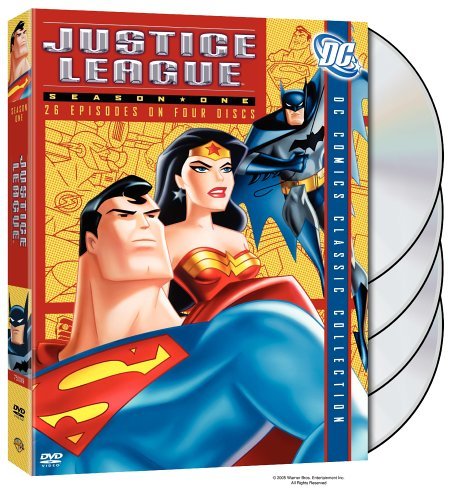 Speaking of which, Timm, Murakami and
their associates employed the use of multi-arc episodes throughout
“Justice League,” in order to further develop the
respective stories and -- most importantly -- give each of the heroes
something to do. Each character has their own voice, and lengthening
the amount of time devoted to each adventure enabled the characters to
be developed in a manner similar to the creative team’s
adaptations of Batman and Superman.
Speaking of which, Timm, Murakami and
their associates employed the use of multi-arc episodes throughout
“Justice League,” in order to further develop the
respective stories and -- most importantly -- give each of the heroes
something to do. Each character has their own voice, and lengthening
the amount of time devoted to each adventure enabled the characters to
be developed in a manner similar to the creative team’s
adaptations of Batman and Superman.
Warner’s four-disc set will not disappoint any fan of the series:
the full-screen transfers are markedly fresh and colorful, and the 2.0
Dolby Surround soundtracks likewise satisfying. Three commentaries (on
“The Enemy Below Part 2,” “Legends Part 2,” and
“The Savage Time Part 2"), interviews with Timm and his staff,
storyboard demonstrations, and a promo reel complete a top-notch
package bursting with action for comic book aficionados of all ages.
Last but not least is the complete first season of TEEN TITANS (2003,
13 episodes, 286 mins; Warner), which Glen Murakami produced for
Cartoon Network.
This younger-skewing series proves that just because a show is geared
more towards a youthful age group than its predecessors, doesn’t
mean it still can’t be fun for adults as well. Robin here teams
up with a group of lesser-known heroes (including Cyborg) to battle the
forces of evil in a show with a more anime-like, Powerpuff Girls-styled
visual design than other DC series. Even the wacky music, with its
theme song by Puffy Ami Yumi, screams of frantic, kid-centric
entertainment, but “Teen Titans” isn’t trying to be a
serious, important version of a comic book: it’s big, splashy,
often quite funny, and bombastic, and no less satisfying for being so.
Just keep your expectations in check and you’re likely to have a
good time.
Warner’s two-disc set preserves all of “Teen
Titans”’ initial 13 episodes in superb full-screen
transfers with 2.0 Dolby Stereo soundtracks. Extras include a handful
of Making Of featurettes sporting interviews with the creative team and
even Puffy Ami Yumi, with a music video from the girls as well.
New From Fox
Fox’s March slate offers all kinds of titles -- both new and of
the catalog variety -- to the mix this month.
Obviously, if you didn’t see WALK THE LINE (***,
2005, 135 mins., PG-13; Fox), then now is the perfect time to
soak up this layered, compelling account of the life and times of
Johnny Cash, as brilliantly portrayed by Joaquin Phoenix. Reese
Witherspoon won a deserved Oscar for her role as June Carter, who
eventually marries Cash and the fame that surrounds him -- and
threatens at times to engulf them both.

Director James Mangold has directed some fine movies over the years
(the under-rated “Copland” being one of my favorites), and
“Walk The Line” offers an authentic, “you are
there” cinematic approach courtesy of Phedon Papamichael’s
cinematography and the performances of both Phoenix and Witherspoon,
who carry the movie through its somewhat predictable bio-pic paces
(yes, the joke that this is “Ray” for white people is true
in some regards: the movie has the same scenes of domestic turbulence
and depicts the protagonist’s inner-demons in a similar,
formulaic fashion). The production of the musical numbers, though, is
superlative (kudos to soundtrack producer/supervisor T Bone Burnett),
and what’s even more amazing is that the stars did their own
vocals, adding to the authenticity of their individual performances.
The movie may only be a bit above average but it’s the
performances of the leads that makes “Walk The Line” well
worth viewing, whether or not you’re a fan of Johnny Cash or his
music.
Fox has released two different editions of “Walk The Line”
on DVD. The single-disc and double-disc editions both include 16:9
(2.35) widescreen presentations with 5.1 DTS and Dolby Digital sound,
commentary from Mangold, 10 deleted scenes, and the original trailer.
Everything about the DVD presentation is on-par with the performances,
meaning it’s both aurally and visually a knockout. The
double-disc Special Edition, meanwhile, also includes extended musical
performances by Phoenix and Witherspoon on the songs “Rock and
Roll Ruby,” “Jackson” and “Cocaine
Blues”; a Making Of that also includes interviews with modern
music stars like Sheryl Crow, Willie Nelson, Kid Rick, Roseanne Cash,
John Mellencamp and others; the featurette “Folsom, Cash and the
Comeback,” which offers a look at Cash’s concert from
Folsom Prison; a featurette on the real-life romance between Cash and
Carter; and five “Walk The Line” collectible postcards
rounding out the package.
The supplements are essential for Cash fans and the movie a good one
with great performances. Recommended!
Also New From Fox
ICE AGE: Super
Cool Edition (***, 2002, 81 mins., G; Fox): Chris Wedge and Blue
Sky Studios’ delightful, and unexpected, box-office smash returns
to DVD in this two-disc “Super Cool Edition,” basically
rehashing all of the fine supplements from Fox’s earlier DVD
release (commentary, deleted scenes with branching, a pair of Blue Sky
shorts, interactive games, the HBO special, and other goodies). The
only exception is that it seems to be missing the “Making Of
‘Ice Age’” documentary from that release, adding here
some “Ice Age 2" material including the trailer from the upcoming
sequel. Otherwise, this is essentially the same DVD as before, with
16:9 and full-screen transfers, 5.1 Dolby Digital sound, and extras
that will entertain both children and adults alike.
 ANASTASIA: FAMILY FUN EDITION (***, 1997, 94 mins.,
G; Fox): Double-disc repackaging of Fox’s 1997
“Anastasia” with its 1999 made-for-video sequel offers a
good dose of family entertainment for the little ones. Don
Bluth’s original theatrical feature remains one of the better
animated films from the late ‘90s, offering splendid widescreen
animation and lyrical songs from Stephen Flaherty and Lynn Ahrens.
Fox’s DVD offers interactive games and most of the extras from
the previous DVD (commentary, documentary, music video) in 16:9
widescreen, while the follow-up “Bartok The Magnificent” is
presented in full-frame and offers a standard, lower-grade video
feature that young kids should still enjoy.
ANASTASIA: FAMILY FUN EDITION (***, 1997, 94 mins.,
G; Fox): Double-disc repackaging of Fox’s 1997
“Anastasia” with its 1999 made-for-video sequel offers a
good dose of family entertainment for the little ones. Don
Bluth’s original theatrical feature remains one of the better
animated films from the late ‘90s, offering splendid widescreen
animation and lyrical songs from Stephen Flaherty and Lynn Ahrens.
Fox’s DVD offers interactive games and most of the extras from
the previous DVD (commentary, documentary, music video) in 16:9
widescreen, while the follow-up “Bartok The Magnificent” is
presented in full-frame and offers a standard, lower-grade video
feature that young kids should still enjoy.
FERNGULLY:
FAMILY FUN EDITION (**, 1992, 76 mins., G; Fox): Another DVD
edition of Fox’s 1992 animated fantasy offers numerous
supplements, some exclusive to this disc, including: storyboards and
concepts from deleted and alternate scenes; multi-angle demonstrations;
audio commentary; and a brand new Making-Of featurette “From
Paper To Tree.” Both 16:9 and full-screen transfers are available
with 5.1 Dolby Digital sound. The somewhat heavy-handed
“Ferngully” is far from my favorite kids’ film,
seeing as I had to endure both it and “An American Tail 2: Fievel
Goes West” while babysitting a toddler in high school, and in the
same night as well. Needless to say, I still shudder at the memory!
RUSTY: THE
GREAT RESCUE (**½, 1998, 92 mins., G; Fox): Very cute,
impossible-to-dislike tele-film from Shuki Levy and Haim Sabam easily
trumps their more bombastic children’s fare (like the Power
Rangers). This tale of a beagle who saves his family’s farm was
obviously inspired by “Babe,” but still offers plenty of
animal hyjinks and strong messages perfectly suited for children. The
full-screen transfer and 2.0 Dolby Digital sound are both just fine.
THE ROACH
APPROACH: SLINGSHOT SLUGGER (2005, 36 mins., G; Fox): Inspired
by the success of the Veggietales series, Bruce Barry’s Wacky
World Studios put together this religious-themed series of kid videos
-- but unfortunately without the humor and heart of its competition.
This colorful, CGI-rendered re-do of the David and Goliath story is
sappy and heavy-handed, though obviously well-intended. Fox’s DVD
includes a segment with Barry, storyboards, and (gasp!) a sneak preview
of the next “Roach Approach.” The full-screen transfer and
5.1 Dolby Digital sound are both perfectly acceptable.
THE THIEF LORD
(**½, 98 mins., 2006, PG; Fox): From the producer of
“The Little Vampire” (but don’t hold it against him)
comes this adaptation of a Cornelia Funke novel, apparently an
acclaimed children’s tale of a young hero who joins up with a
group of abandoned children to steal from the rich in Italy. A
primarily German production with European stars (Jim Carter, Caroline
Goddall, Rollo Weeks), this decent family film is reasonably
well-produced, and offers both scenic Venice locales and a pleasant
score by Nigel Clarke and Michael Csanyi-Wells. Fox’s DVD offers
both widescreen (16:9, 2.35) and full-screen versions, deleted scenes,
the theatrical trailer and other goodies.
Also New From Fox
LITTLE
MANHATTAN (***, 2005, 90 mins., PG; Fox): Now here’s a
sleeper worth checking out: Josh Hutcherson and Charlie Ray play
pre-teens who fall for each other in this charming, low-key offering
from writer Jennifer Flackett and director Mark Levin. This Arnon
Milchan-produced Regency production (one of two that saw scant
distribution last year; see also “Bee Season” below)
functions as a cinematic valentine to the Big Apple, and comes off as
an unpretentious, refreshing film perfect for kids and adults alike.
Fox’s DVD includes a 16:9 (2.35) and full-screen transfers,
commentary from Flackett and Levin, deleted scenes and a pair of
featurettes. Recommended!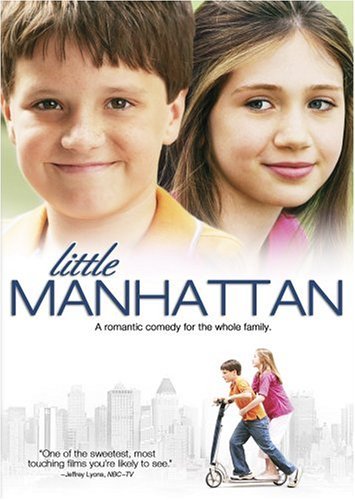
BEE SEASON
(**½, 2005, 104 mins., PG-13; Fox): Little-seen and
barely-distributed story of a dysfunctional family, led by dad Richard
Gere and mom Juliette Binoche, who attempt to find themselves through
daughter Flora Cross’ involvement in the National Spelling Bee.
Scott McGehee and David Siegel’s tale of angst and religious
mysticism isn’t entirely satisfying and rambles quite a bit, but
the performances make it compelling. Fox’s DVD includes
full-screen and 16:9 (2.35) widescreen transfers, 5.1 Dolby Digital
sound, two different commentary tracks, six deleted scenes, three
Making Of featurettes, and the trailer.
THE STORY OF
RUTH (***, 1960, 131 mins., Fox)
DAVID AND
BATHSHEBA (**½, 1951, 116 mins., Fox): A pair of Old
Testament titles from Fox, just in time for Easter, hit DVD for the
first time this week.
“The Story of Ruth” is an old-fashioned, almost
“intimate” Fox spectacle that adapts the Old Testament
story of Ruth, as portrayed here by the voluptuous Elana Eden, who
didn’t last long in the movie business. Not all the performances
by the cast (Stuart Whitman, Tom Tryon, Peggy Wood, Viveca Lindfors)
work, but it’s an entertaining, well-crafted product of an era
long since past in the cinema, with an accent on the characters as
opposed to most of the epics of its time. Fox’s widescreen DVD
presentation showcases this Cinemascope presentation in its full glory,
though the print displays its age, appearing somewhat faded and grainy
in places. The 4.0 Dolby Digital stereo track, meanwhile, excellently
conveys Franz Waxman’s marvelous, Golden Age score. Recommended!
Also newly out from Fox is the DVD debut of the studio’s 1951
Technicolor production “David and Bathsheba,” starring
Gregory Peck and Susan Hayward. Shot in the standard Academy aspect
ratio, this Henry King-directed, Darryl F. Zanuck production offers a
terrific Alfred Newman score and some silly dialogue courtesy of the
Philip Dunne script (not to mention a somewhat languid pace), but
it’s nevertheless entertaining for what it is. Fox’s
full-screen transfer looks nice and both stereo and mono soundtracks
round out the disc.
FIVE WEEKS IN A
BALLOON (**½, 1962, 101 mins., PG; Fox): One of Irwin
Allen’s earliest adventures puts Sir Cedric Hardwicke, Fabian,
Red Buttons, Richard Haydn, and Barbara Eden -- not to mention a monkey
-- into a balloon intended to explore uncharted African territory in
this loose Jules Verne adaptation. “Around The World in 80
Days” this isn’t, but for those viewers old enough to
recall the nostalgic, if juvenile, fantasies of the ‘60s, this
colorful slice of fluff isn’t bad. Fox’s DVD includes both
16:9 and full-screen transfers (at least in better condition than
“The Story of Ruth”), plus 2.0 Dolby Stereo and mono
soundtracks.
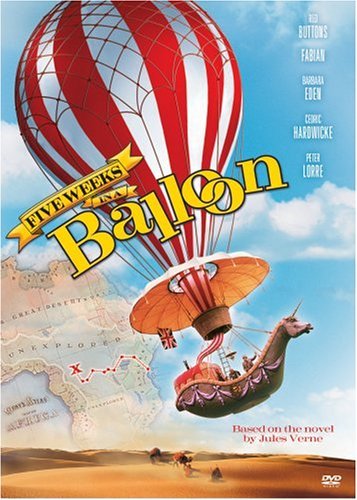 DIMPLES (1936, 78 mins.; Fox)
DIMPLES (1936, 78 mins.; Fox)
THE LITTLEST
REBEL (1935, 73 mins.; Fox)
THE LITTLE
COLONEL (1935, 81 mins., Fox): America’s original little
sweetheart is back on DVD in three new catalog offerings from Fox,
including two of Temple’s best vehicles (“The Little
Colonel,” co-starring Lionel Barrymore, and “The Littlest
Rebel,” each from 1935), along with the less-highly regarded
“Dimples.” Each DVD includes a remastered black-and-white
transfer and -- yes -- a newly colorized version of each of these
vintage mid ‘30s favorites, presumably so kids can enjoy them
without resorting to throwing tantrums over the fact that they’re
not in color (oh no!). For what it’s worth, the colorization
process newly employed for these three transfers is leagues ahead of
previous colorized efforts from the ‘80s, but no matter, the
black-and-white versions are obviously preferable and have been
likewise remastered, along with modest stereo soundtracks (the original
mono versions are also included).
LOVE’S
LONG JOURNEY (2005, 85 mins., Fox): Third TV-film from Janette
Oke’s “Love Comes Softly” book series continues to
examine a young couple’s trials and tribulations in the prairie
of the old west. Michael Landon, Jr.’s sincere direction recalls
his father’s “Little House,” with a strong sense of
morality and meaningful performances from its cast. Fox’s DVD
includes a full-screen transfer and 2.0 Dolby Digital surround,
offering a pleasant score by Kevin Kiner.
THE
SIMPLE LIFE 3: INTERNS (2005, 336 mins., Fox): The last
gasp (we all hope) for the reality series starring Paris Hilton and
Nicole Richie takes the girls (I hesitate to call either
“ladies”) to undertake a myriad of tasks across the nation.
Good for a few laughs...for a couple of minutes...but you may find your
patience being tried as you sample all 16 episodes of the “Simple
Life”’s third season. Full-screen transfers and 2.0 Dolby
Digital stereo soundtracks are both fine on this double-disc set.
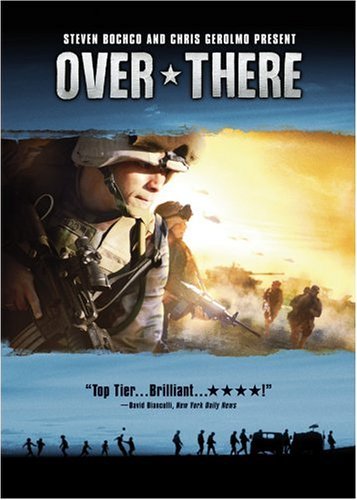 New Fox TV on DVD
New Fox TV on DVD
OVER THERE: The
Complete Series (2005, 13 episodes, 574 minutes; Fox)
WHITE SHADOW:
The Complete Season 2 (1979-1980, 24 Episodes, 1173 minutes; Fox)
Fox’s latest TV-on-DVD box sets include the second stanza of the
popular “White Shadow” series, co-created by Steven Bochco
-- who also suffered a ratings disappointment last year with the FX
series “Over There,” which Fox also debuts this week on DVD.
The entertaining “White Shadow” offers four discs packed
with the series’ 24 second season episodes in solid full-screen
transfers, with commentary on “Globetrotters” by Kevin
Hooks, Byron Stewart, Erik Kilpatrick and Ira Augustain;
“Needle” by Victor Lobl, and “The Death of Me
Yet” by Marc Rubin. There are also three new featurettes,
including a tribute to series producer Bruce Paltrow.
Like “Jarhead,” it seems that the Iraq War is too current
in the minds of most viewers, who largely bypassed Bochco’s
well-meaning and crafted “Over There” last summer. This
short-lived series about a U.S. army unit sent to Iraq, contrasted by
(inferior) domestic scenes of their loved ones worrying about them, is
superbly acted and directed (Mikael Solomon and D.J. Caruso are among
the filmmakers behind the 13 episodes), but on the same hand, it offers
little that we haven’t seen before...despite its contemporary
setting. Fox’s four-disc set includes 16:9 transfers, 5.1 Dolby
Digital sound, selected commentaries, a Making Of featurette and
documentary on the production. Despite its drawbacks, “Over
There” is an intriguing series worth catching if you missed it on
DVD.
Psychological Horrors
of Domestic and International Persuasions
Ewan McGregor plays a psychiatrist assigned to analyze art student Ryan
Gosling, who’s contemplating suicide, in “Monster
Ball” director Marc Foster’s STAY (**½, 99
mins., R; Fox), which was released to minimal box-office returns
last fall.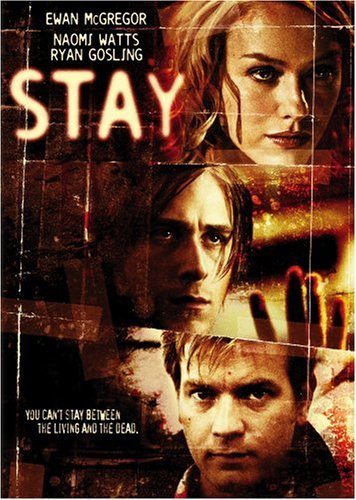
David Benioff’s script fits clearly into the “puzzle”
movie formula where nothing that happens seems quite real: transitional
devices, repetition in dialogue, and off-kilter performances make
“Stay” a product of the M. Night Shyamalan school
essentially right from the start. The trick to making a film like this
work is two-pronged: even though you know the film has a twist in store
at the end, is the movie effective enough to keep you guessing what it
is, and finally, is that resolution worth all the build up?
The answers with “Stay” fall somewhere in the middle. The
ending, at least for my tastes, proves to be a rehash of other stories
we’ve seen before (think “An Incident At Owl Creek
Bridge” or “Jacob’s Ladder”), and the
movie’s constantly depressing atmosphere makes it difficult to
care about any of the characters or the situations they find themselves
in. Still, director Foster maintains an interesting visual design to
“Stay,” with an effective use of Robert Schaeffer’s
scope cinematography, enough that genre fans may warm to this
guess-the-ending tale.
Fox’s DVD includes both widescreen (2.35) and full-screen
transfers, along with 5.1 Dolby Digital sound. Extras include
commentary from the director, two featurettes (including a look at the
score by Asche and Spencer), and the original trailer. Viewers may note
the featurettes are split between the two sides (widescreen,
full-screen) of the same disc.
If you thought “Stay” was odd, it’s got nothing on
Takashi Shimizu’s latest Japanese horror import, MAREBITO (*½,
2004, 92 mins., R; Tartan).
Unlike Shimizu’s “Ju-On” (“The Grudge”),
this offering is an unlikely candidate for an American remake, since it
spins an often-incoherent assembly of images, centering on a cameraman
(Shinya Tsukamoto) obsessed with a man’s suicide.
Tsukamoto’s investigation into the terror the man displays prior
to gouging out his eyeball leads him to uncover a mute girl in an
underground city (!) beneath the subway system, who promptly displays
signs of feasting on blood. Meanwhile, Tsukamoto’s wife pops up,
asking to see their daughter, whom Tsukamoto has no knowledge of...
“Marebito” is unpleasant, strange and gory, and unlike the
better Japan horrors of recent years, also does not offer a stylish
visual presentation: Shimizu’s accent here is on grainy, dirty
images that reflect Tsukamoto’s personality. A few scattered
shocks appear here and there, but the movie more often than not plods
along with narration from its leading character that’s often as
puzzling as the images you see. Ultimately, it’s difficult to
make out what “Marebito” is trying to say, other than its
anti-hero is a sick, twisted guy -- whether or not you feel
that’s worth wasting 92 minutes of your time on is entirely up to
you.
Tartan’s DVD does offer an excellent presentation of
“Marebito,” with 16:9 (1.78) widescreen and 5.1 DTS and
Dolby Digital sound, boasting English and Spanish subtitles. Extras
include subtitled interviews with Shimizu, Tsukamoto, and producer
Hiroshi Takahashi, plus the original trailer.
NEXT
TIME: CHICKEN LITTLE, THE CUTTING EDGE 2, DERAILED, and
More! Don't
forget
to drop in
on the official Aisle Seat Message
Boards, direct
any emails to the
link
above and
we'll catch you
then. Cheers everyone!

Copyright 1997-2006 All Reviews, Site and Design by Andy
Dursin







 for full-screen formatting, but rather a
situation where the film was composed for a more TV-like aspect ratio
in the first place. That said, there’s a bit more information on
the sides of the image throughout in comparison to previous versions,
while the bottom of the frame is mostly unscathed by the matting
(adding further evidence that its intended ratio was more along the
lines of 1.66 than 1.85).
for full-screen formatting, but rather a
situation where the film was composed for a more TV-like aspect ratio
in the first place. That said, there’s a bit more information on
the sides of the image throughout in comparison to previous versions,
while the bottom of the frame is mostly unscathed by the matting
(adding further evidence that its intended ratio was more along the
lines of 1.66 than 1.85).
 Speaking of which, Timm, Murakami and
their associates employed the use of multi-arc episodes throughout
“Justice League,” in order to further develop the
respective stories and -- most importantly -- give each of the heroes
something to do. Each character has their own voice, and lengthening
the amount of time devoted to each adventure enabled the characters to
be developed in a manner similar to the creative team’s
adaptations of Batman and Superman.
Speaking of which, Timm, Murakami and
their associates employed the use of multi-arc episodes throughout
“Justice League,” in order to further develop the
respective stories and -- most importantly -- give each of the heroes
something to do. Each character has their own voice, and lengthening
the amount of time devoted to each adventure enabled the characters to
be developed in a manner similar to the creative team’s
adaptations of Batman and Superman.
 ANASTASIA: FAMILY FUN EDITION (***, 1997, 94 mins.,
G; Fox): Double-disc repackaging of Fox’s 1997
“Anastasia” with its 1999 made-for-video sequel offers a
good dose of family entertainment for the little ones. Don
Bluth’s original theatrical feature remains one of the better
animated films from the late ‘90s, offering splendid widescreen
animation and lyrical songs from Stephen Flaherty and Lynn Ahrens.
Fox’s DVD offers interactive games and most of the extras from
the previous DVD (commentary, documentary, music video) in 16:9
widescreen, while the follow-up “Bartok The Magnificent” is
presented in full-frame and offers a standard, lower-grade video
feature that young kids should still enjoy.
ANASTASIA: FAMILY FUN EDITION (***, 1997, 94 mins.,
G; Fox): Double-disc repackaging of Fox’s 1997
“Anastasia” with its 1999 made-for-video sequel offers a
good dose of family entertainment for the little ones. Don
Bluth’s original theatrical feature remains one of the better
animated films from the late ‘90s, offering splendid widescreen
animation and lyrical songs from Stephen Flaherty and Lynn Ahrens.
Fox’s DVD offers interactive games and most of the extras from
the previous DVD (commentary, documentary, music video) in 16:9
widescreen, while the follow-up “Bartok The Magnificent” is
presented in full-frame and offers a standard, lower-grade video
feature that young kids should still enjoy.
 DIMPLES (1936, 78 mins.; Fox)
DIMPLES (1936, 78 mins.; Fox) New Fox TV on DVD
New Fox TV on DVD
